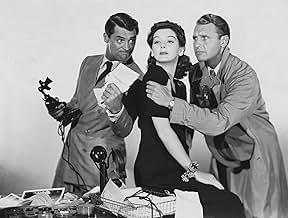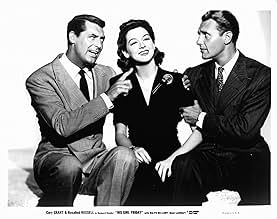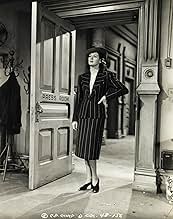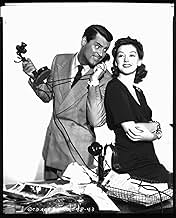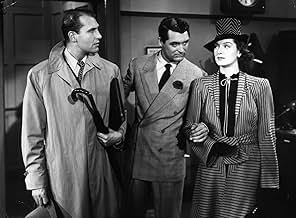AVALIAÇÃO DA IMDb
7,8/10
66 mil
SUA AVALIAÇÃO
Um editor de jornal usa todos os truques do livro para impedir que sua ex-mulher, uma repórter, se case novamente.Um editor de jornal usa todos os truques do livro para impedir que sua ex-mulher, uma repórter, se case novamente.Um editor de jornal usa todos os truques do livro para impedir que sua ex-mulher, uma repórter, se case novamente.
- Direção
- Roteiristas
- Artistas
- Prêmios
- 5 vitórias e 1 indicação no total
Avaliações em destaque
Charles McArthur and Ben Hecht met when both were reporters in Chicago during the 1920s. They created two of the funniest farces in American drama, TWENTIETH CENTURY (about theater people) and THE FRONT PAGE. The latter was based on their experiences as news reporters in those crazy days in Chicago, where the newspapers concentrated on sensationalism and the politics was thoroughly corrupt. The resulting play is hysterically funny and yet remains timely. For all the exaggeration of how Walter Burns and Hildy Johnson manipulate police, politicians, reporters, and civilians to get their scoop, the story remains relevant for several reasons. The political balance in a big Mayoralty election is precarious due to the Earl Williams case. Williams has shot a policeman who is African-American, a big local voting block, and they want him punished. The corrupt Mayor and his idiot jail warden are willing to execute him for the votes needed to stay in office, but the Governor (who is from the rival party) believes the killer is insane (or at least mentally deficient). So already (as you see) race, politics, and the validity of the death penalty get pulled in. Soon we also see examples of nepotism and corruption in the police, and City Hall, cynical politics based on a man's life, and questions about privacy and a free press. For a play from 1931 this one still has relevance.
There had been an earlier version of the play in the 1930s called THE FRONT PAGE, starring Adolphe Menjou as the conniving and devious Walter Burns, and Pat O'Brien as ace reporter Hildy Johnson. It is a good version, and both stars do well with their parts (and both have the verbal speed necessary for the dialog to flow over the ears of the audience). But when the film was remade in 1940, Howard Hawks decided to redraw Hildy Johnson into a female reporter (and previous wife) of Burns. His casting of Cary Grant was radically different too. Burns is a nasty, conniving s.o.b. who would kill for a good story. Menjou was somewhat dapper (he was usually dapper) in the role, but the hardness under the presentable shell was there. And by changing Hildy from a guy to a gal, and Walter's former wife, you had to make Walter look more interesting. So Walter is turned into Cary Grant. There was a search for Hildy, involving Jean Arthur and Irene Dunne as possibilities. Neither ended up playing him. Instead it went to Rosalind Russell.
It has to be admitted Russell had the vocal abilities to push the dialog at the proper clip. Possibly Jean Arthur could have done that just as well, but Arthur did not have the apparent physical strength behind the stylishness that Russell showed. She really does balance well (in this film) with Grant, given their characters.
Motivation changes a little. This Walter Burns still wants to get his scoops, but there are moments of fragility when he realizes he may forever lose Hildy to her fiancé Bruce (the ever helpless Ralph Bellamy). And they oddly work (Hawks manages to keep them under control). Also, as the story is now twelve years older than the original play, certain changes occur in Walter's political views. He does dislike the gang (led by Clarence Kolb and Gene Lockhart) running the city, and points out to Hildy that they have a chance to help give the city the sort of government New York City has under La Guardia. This does not end his joy at scooping the opposition, but it does suggest that Burns has more depth.
It is now generally believed that this is the best of the film versions of THE FRONT PAGE, and one of the funniest films ever made. The entire cast shines (look at the scene where Helen Mack confronts the reporters who have made her look like a tramp, and have told lies about John Qualen (Williams) - she is in a state when Russell takes her out of the press room, and the reporters are thoroughly ashamed of herself - and Russell comes back looking at Regis Toomey, Porter Hall, and the others, and says "Gentlemen of the Press!" with heavy cynical irony). And also note Billy Gilbert's immortal Joe Pettibone, the most hopeless monument of total befuddlement in movies. It is one of the few film comedies of that period that retains it's laughs one viewing following another.
There had been an earlier version of the play in the 1930s called THE FRONT PAGE, starring Adolphe Menjou as the conniving and devious Walter Burns, and Pat O'Brien as ace reporter Hildy Johnson. It is a good version, and both stars do well with their parts (and both have the verbal speed necessary for the dialog to flow over the ears of the audience). But when the film was remade in 1940, Howard Hawks decided to redraw Hildy Johnson into a female reporter (and previous wife) of Burns. His casting of Cary Grant was radically different too. Burns is a nasty, conniving s.o.b. who would kill for a good story. Menjou was somewhat dapper (he was usually dapper) in the role, but the hardness under the presentable shell was there. And by changing Hildy from a guy to a gal, and Walter's former wife, you had to make Walter look more interesting. So Walter is turned into Cary Grant. There was a search for Hildy, involving Jean Arthur and Irene Dunne as possibilities. Neither ended up playing him. Instead it went to Rosalind Russell.
It has to be admitted Russell had the vocal abilities to push the dialog at the proper clip. Possibly Jean Arthur could have done that just as well, but Arthur did not have the apparent physical strength behind the stylishness that Russell showed. She really does balance well (in this film) with Grant, given their characters.
Motivation changes a little. This Walter Burns still wants to get his scoops, but there are moments of fragility when he realizes he may forever lose Hildy to her fiancé Bruce (the ever helpless Ralph Bellamy). And they oddly work (Hawks manages to keep them under control). Also, as the story is now twelve years older than the original play, certain changes occur in Walter's political views. He does dislike the gang (led by Clarence Kolb and Gene Lockhart) running the city, and points out to Hildy that they have a chance to help give the city the sort of government New York City has under La Guardia. This does not end his joy at scooping the opposition, but it does suggest that Burns has more depth.
It is now generally believed that this is the best of the film versions of THE FRONT PAGE, and one of the funniest films ever made. The entire cast shines (look at the scene where Helen Mack confronts the reporters who have made her look like a tramp, and have told lies about John Qualen (Williams) - she is in a state when Russell takes her out of the press room, and the reporters are thoroughly ashamed of herself - and Russell comes back looking at Regis Toomey, Porter Hall, and the others, and says "Gentlemen of the Press!" with heavy cynical irony). And also note Billy Gilbert's immortal Joe Pettibone, the most hopeless monument of total befuddlement in movies. It is one of the few film comedies of that period that retains it's laughs one viewing following another.
Apparently Howard Hawks must've assumed that Cary Grant could carry off even the most abrasive of lead roles. Sure, Grant specialized in snappy banter with a caustic touch, but it was usually balanced with self-deprication and an unrealistic modesty. Unfortunately, none of that humanity is present here, just endless, overlapping sniping, arguing and scheming, at ninety miles a minute. How anyone can muster any sympathy for Grant's character is beyond me.
The crossfire dialogue is occasionally relieved by stretches of tedium. Rosalind Russell is charming and bright, and Ralph Bellamy does the best he can with what he's given. While there may be occasional touches of wit and good characterizations from the actors, His Girl Friday is one of the most irritating of Howard Hawks' films.
The crossfire dialogue is occasionally relieved by stretches of tedium. Rosalind Russell is charming and bright, and Ralph Bellamy does the best he can with what he's given. While there may be occasional touches of wit and good characterizations from the actors, His Girl Friday is one of the most irritating of Howard Hawks' films.
10banjoboy
I just finished watching the DVD of this first-class, semi-Screwball comedy in Columbia Classics beautiful transfer, and it absolutely made my day! What a movie! What a screenplay! The dialogue is better - more modern - in fact, than a in lot of contemporary movies. It's incredibly funny, too, and my teenage sons kept laughing right along with me at the smart come-backs. Cary Grant is, of course, as good (if not better) than ever, and I've never seen Rosalind Russel in a role that suited her more perfectly. And that's just for starters: The timing of the thing is still awe- inspiring after sixty-odd years; the supporting actors, down to the bit-players, are all memorable, convincing and hilarious; the camera work (this IS the forties, though) is inventive and the editing superb. I can safely confess now that I hadn't ever seen it before, but that's no reason for you to make the same mistake: Go buy/rent it NOW! Hats off to the great Howard Hawks, his cast and crew for pulling this comedy masterpiece off. And thank you, thank you, thank you Columbia Pictures, for
making it possible for me to watch it in such pristine condition! (I've got the 2002 edition, and from what I've heard you should beware of earlier DVD issues).
making it possible for me to watch it in such pristine condition! (I've got the 2002 edition, and from what I've heard you should beware of earlier DVD issues).
10TuckMN
This screen adaptation of the Ben Hecht and Charles MacArthur play "The Front Page" was adapted for the talents of Cary Grant and Rosalind Russell -- there is no such character as Hildy Johnson (Russell) in that play.
Director Howard Hawks wanted to show the whirlwind pace of the newsroom in the criminal courts system so he had his actors overlap their lines -- so much so that at times it seems as though everyone is talking at once; it even gets difficult to understand all that is going on.
He also had the cast move FAST so the film looks totally frenetic from scene to scene with no respite -- either from the laughs or from the action.
There are two really good "inside" jokes in the script: The first is where Walter Burns (Grant) is describing Hildy's fiancee and says that "he looks like that guy in the movies -- Bellamy," Well, it WAS Ralph Bellamy playing that part!
The other is when Burns says something about someone he once knew named "Archie Leach" which just happens to be Cary Grant's real name.
This is one of the true gems of Hollywood's most prolific era. It has incredible pacing, acting, photography and an authentic gritty feeling that would be associated with hard-boiled, "anything for a story" newspaper people.
It has long been one of my favorite films and deserves to be watched over and over again -- just for all the dialogue and great acting that may have gone by so fast you missed it the first time.
Director Howard Hawks wanted to show the whirlwind pace of the newsroom in the criminal courts system so he had his actors overlap their lines -- so much so that at times it seems as though everyone is talking at once; it even gets difficult to understand all that is going on.
He also had the cast move FAST so the film looks totally frenetic from scene to scene with no respite -- either from the laughs or from the action.
There are two really good "inside" jokes in the script: The first is where Walter Burns (Grant) is describing Hildy's fiancee and says that "he looks like that guy in the movies -- Bellamy," Well, it WAS Ralph Bellamy playing that part!
The other is when Burns says something about someone he once knew named "Archie Leach" which just happens to be Cary Grant's real name.
This is one of the true gems of Hollywood's most prolific era. It has incredible pacing, acting, photography and an authentic gritty feeling that would be associated with hard-boiled, "anything for a story" newspaper people.
It has long been one of my favorite films and deserves to be watched over and over again -- just for all the dialogue and great acting that may have gone by so fast you missed it the first time.
Every good thing you've heard about this movie is true. It may very well be the fastest paced movie I've ever seen. Jerry Bruckheimer's most hyperbolic action movie ain't got nothing' on this one.
Cary Grant and Rosalind Russell were a brilliant screen pair (indeed, it seems that no one was bad casting when paired with Cary Grant) as rival reporters in a furiously paced news office. Russell is the odd man, or should I say odd girl, out, due to her lack of a penis, but she proves herself more than capable of holding her own with the boys.
Russell charges across the screen and never loses momentum for a second. She's goofy, sexy and hysterical. The funniest moment in the film comes when she's chasing a man down the street (I won't go into details) and dive tackles him to the ground.
One of the first films from the 40s and a highlight of the decade.
Grade: A+
Cary Grant and Rosalind Russell were a brilliant screen pair (indeed, it seems that no one was bad casting when paired with Cary Grant) as rival reporters in a furiously paced news office. Russell is the odd man, or should I say odd girl, out, due to her lack of a penis, but she proves herself more than capable of holding her own with the boys.
Russell charges across the screen and never loses momentum for a second. She's goofy, sexy and hysterical. The funniest moment in the film comes when she's chasing a man down the street (I won't go into details) and dive tackles him to the ground.
One of the first films from the 40s and a highlight of the decade.
Grade: A+
Você sabia?
- CuriosidadesIt is estimated that the normal rate of verbal dialogue in most films is around 90 words a minute. In Jejum de Amor (1940), the delivery has been clocked at 240 words a minute.
- Erros de gravaçãoWhen Bruce Baldwin comes to the press room late in the movie, an electric fan and small shelf on the wall to the left of the door both completely disappear. Both have been there in all previous scenes and both reappear after this scene.
- Citações
[describing Bruce]
Walter Burns: He looks like that fellow in the movies - Ralph Bellamy.
- Cenas durante ou pós-créditosOpening credits prologue: It all happened in the "Dark Ages" of the newspaper game--when to a reporter "Getting that story" justified anything short of murder.
Incidentally you will see in this picture no resemblance to the man and woman of the press today.
Ready?
Well, once upon a time - -
- ConexõesEdited into Michael Jackson: This Is It (2009)
Principais escolhas
Faça login para avaliar e ver a lista de recomendações personalizadas
Detalhes
- Data de lançamento
- País de origem
- Idiomas
- Também conhecido como
- Ayuno de amor
- Locações de filme
- Empresa de produção
- Consulte mais créditos da empresa na IMDbPro
Bilheteria
- Faturamento bruto mundial
- US$ 330
- Tempo de duração1 hora 32 minutos
- Cor
- Proporção
- 1.37 : 1
Contribua para esta página
Sugerir uma alteração ou adicionar conteúdo ausente




